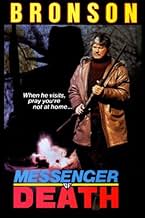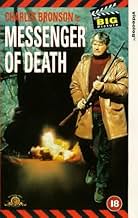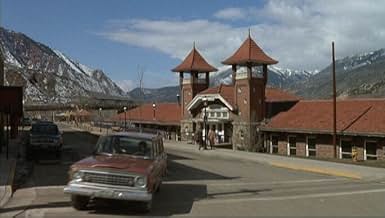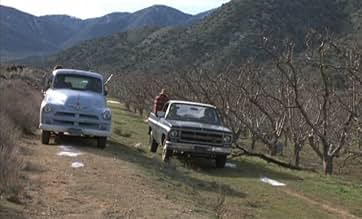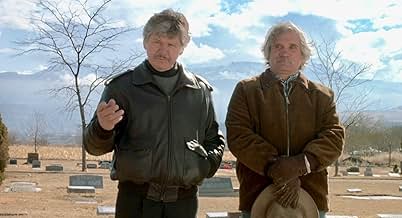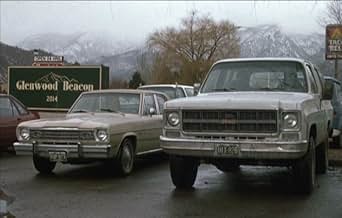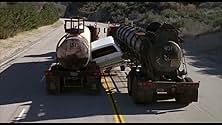AVALIAÇÃO DA IMDb
5,4/10
3,7 mil
SUA AVALIAÇÃO
Adicionar um enredo no seu idiomaA Denver reporter investigates the mass murder of a family of Mormons in rural Colorado.A Denver reporter investigates the mass murder of a family of Mormons in rural Colorado.A Denver reporter investigates the mass murder of a family of Mormons in rural Colorado.
- Direção
- Roteiristas
- Artistas
- Direção
- Roteiristas
- Elenco e equipe completos
- Produção, bilheteria e muito mais no IMDbPro
Avaliações em destaque
The film has Charles Bronson in its favor, and is fairly well-made. It'a a little unbelievable, but fans of the genre or Bronson should enjoy it. Basically, Charles Bronson is an investigative reporter who investigates the slaying of a man's family, originally under the impression that the slaying was due to religious differences. One thing of minor note...it's not really a feud between different Mormon sects. The LDS Church has banned polygamy, in accordance with federal law, and excommunicates members who practice it. I suppose some might say that all the break-off groups(like the RLDS, FLDS and polygamist clans) can be considered part of a Mormon Religious Umbrella....but that would be kind of like saying members of the Russian Orthodox Church are really Catholic.
A movie where Charles Bronson doesn't kill anyone. Despite the title. Despite the poster or the video cover. There are indeed deaths, in a Mormon family, where children and women are massacred (this is the beginning of the film). Charles Bronson is a journalist who investigates to understand why a family of Mormons has been decimated. He conducts the investigation on his own, at his own pace, independently of the police, supported by his newspaper, which wants to create a sensation.
The documentary side of the film presents us with the thought patterns of these Mormons, where God's will (which explains everything) and vengeance go hand in hand, in a country where guns are freely available. The messenger of death is the killer who decimated the family, unrelated to the character of Charles Bronson who investigates. Or, the journalist through his investigation, who will indirectly provoke reprisals between Mormon families.
Another interesting element of the film is the natural settings of Colorado. Let's add a superb music that can make us think of a horror movie: the composer, Robert O. Ragland is unknown to us, but has signed many film scores. This one is interesting, because it suits the suspense and horror.
The film ends with evil capitalists and politicians greedy for money.
The film can be watched without any problem. The scenes in the city (Denver, the capitalists, the important people) are the perfect counterpoint to the scenes in the countryside where Charles Bronson investigates and ends up putting the pieces of the puzzle together in the Mormon farms.
The documentary side of the film presents us with the thought patterns of these Mormons, where God's will (which explains everything) and vengeance go hand in hand, in a country where guns are freely available. The messenger of death is the killer who decimated the family, unrelated to the character of Charles Bronson who investigates. Or, the journalist through his investigation, who will indirectly provoke reprisals between Mormon families.
Another interesting element of the film is the natural settings of Colorado. Let's add a superb music that can make us think of a horror movie: the composer, Robert O. Ragland is unknown to us, but has signed many film scores. This one is interesting, because it suits the suspense and horror.
The film ends with evil capitalists and politicians greedy for money.
The film can be watched without any problem. The scenes in the city (Denver, the capitalists, the important people) are the perfect counterpoint to the scenes in the countryside where Charles Bronson investigates and ends up putting the pieces of the puzzle together in the Mormon farms.
Charles Bronson plays investigative reporter Garret Smith for the Denver Tribune in this motion picture about a blood feud between two brothers, of different Mormon sects. With outside political as well as economic overtones.
A decent story about religious jealousy and the behind the scenes politics of exploiting it. The feud between brothers Willis, Jeff Corey, and Zenas, John Ireland, Beecham is instigated when Willis' son's Orville's, Charles Dierkop, family is massacred. Willis believes that it was the work of Zenas and starts an all out war against his brother which ends with both brothers getting killed. But there's something else that has nothing to do with the feud between the brother's that's central to the story: A lake of artesian water under brother's Zenas' property that can be used to turn common and plentiful shale into valuable and scarce fuel oil.
Charles Bronson is still believable, at age 67, as the tough reporter that gets to the bottom of the story with his fists as well as his typewriter to uncover the truth about Orville's family being murdered. As well as who ordered it that instigated a war between his father and uncle and why.
With the exception of the beginning the movie "Messenger of Death" cuts down on the violence and concentrated more on the story which made the movie more interesting to watch. And also gave the audience more time to think who's behind the murders that happened to the Orville Beecham family which built up to a better then average ending.
The ending of "Messenger of Death" though a bit contrived and what seemed forced still tied the story together and made it believable. One of Charles Bronson's best later efforts when he was still effective as an action hero, or in this case an action reporter, on the screen.
A decent story about religious jealousy and the behind the scenes politics of exploiting it. The feud between brothers Willis, Jeff Corey, and Zenas, John Ireland, Beecham is instigated when Willis' son's Orville's, Charles Dierkop, family is massacred. Willis believes that it was the work of Zenas and starts an all out war against his brother which ends with both brothers getting killed. But there's something else that has nothing to do with the feud between the brother's that's central to the story: A lake of artesian water under brother's Zenas' property that can be used to turn common and plentiful shale into valuable and scarce fuel oil.
Charles Bronson is still believable, at age 67, as the tough reporter that gets to the bottom of the story with his fists as well as his typewriter to uncover the truth about Orville's family being murdered. As well as who ordered it that instigated a war between his father and uncle and why.
With the exception of the beginning the movie "Messenger of Death" cuts down on the violence and concentrated more on the story which made the movie more interesting to watch. And also gave the audience more time to think who's behind the murders that happened to the Orville Beecham family which built up to a better then average ending.
The ending of "Messenger of Death" though a bit contrived and what seemed forced still tied the story together and made it believable. One of Charles Bronson's best later efforts when he was still effective as an action hero, or in this case an action reporter, on the screen.
Easily skip-able Charles Bronson movie that starts out strongly but doesn't follow through. He unconvincingly plays a Denver reporter covering a case of a Mormon family living in the Colorado mountains who had nine members massacred, including five children. He then sets out to find the killer by visiting the eccentric community and finds that much of the evidence leads to a family feud between two brothers, along with ties to a water company. Why Chuck's character would feel so personally bent on dealing out vengeance when it's not his own flesh and blood didn't ever strike me as authentic. J. Lee Thompson directs (as usual) and manages to serve up some pretty scenery along with a good cast including John Ireland and Jeff Corey, but this is rather weak tea. ** out of ****
Bronson is rather miscast as a reporter (who still can punch and defeat any opponent), but this is one of his least typical and most solid vehicles from the 80's. It begins with a weird, effectively staged massacre and includes some offbeat elements along with the familiar ones. It's still nothing special, though. It's one of those curiously forgettable films that keep you interested while you're watching them, but leave no lasting impression.
Você sabia?
- CuriosidadesDirector J. Lee Thompson fell ill during the making of this film, the picture was finished by second unit director, Robert C. Ortwin Jr..
- Erros de gravaçãoDuring the car chase, Smith's car is on the inside of one of the tankers on the first corner out of the tunnel, but in the next shot it's back in the middle of both tankers.
- Citações
Garret Smith: [punching the assassin] Bastard child killer!
- Versões alternativasAlmost 5 minutes were cut in Finland for VHS distribution. Later released on DVD as uncut.
- ConexõesReferenced in DVD/Lazerdisc/VHS collection 2016 (2016)
Principais escolhas
Faça login para avaliar e ver a lista de recomendações personalizadas
- How long is Messenger of Death?Fornecido pela Alexa
Detalhes
- Data de lançamento
- País de origem
- Idioma
- Também conhecido como
- Messenger of Death
- Locações de filme
- Empresas de produção
- Consulte mais créditos da empresa na IMDbPro
Bilheteria
- Faturamento bruto nos EUA e Canadá
- US$ 3.074.681
- Fim de semana de estreia nos EUA e Canadá
- US$ 1.035.279
- 18 de set. de 1988
- Faturamento bruto mundial
- US$ 3.074.681
- Tempo de duração
- 1 h 31 min(91 min)
- Cor
- Mixagem de som
- Proporção
- 1.85 : 1
Contribua para esta página
Sugerir uma alteração ou adicionar conteúdo ausente


